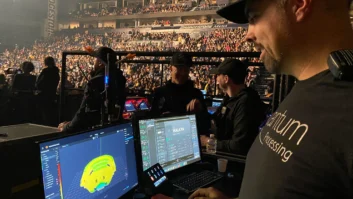
In June, Polycom announced what it called “the biggest news in this industry in over a decade”: the launch of the Open Visual Communications Consortium (OVCC), which seeks to provide a seamless experience for users of video communications – both business-to-business and business-to-consumer – over the networks of multiple service providers.
Fourteen telecoms providers, including AT&T, BT Conferencing, Orange Business Services and Verizon signed up to the OVCC at launch, with more expected to join over the coming months. The announcement was made in a webcast by Polycom CEO Andy Miller and various partners. At the same time, Polycom announced that it is acquiring HP’s Visual Collaboration business, including the Halo Products and Managed Services business.
A few weeks beforehand, Miller had issued a statement welcoming the acquisition of Skype by Microsoft, saying it “takes Skype out of the competitive equation and places it with one of our closest strategic partners”.
Paddy Baker spoke to Gary Rider, EMEA president of Polycom, at the launch.
You’ve announced the formation of the OVCC, and it was mentioned that it will be about a year before its efforts come to fruition. So how much work has been done to date, and how much is still to be done in the coming year?
Back in January a pilot was enacted by the service providers with Polycom to prove the interoperabilities. Twelve service providers took part in that [over 18 standards-based systems], so the concept has already been proven in a controlled environment. Now it’s really down to the service providers to thrash out the details of when they can come up with solutions.
The next 12 months or so will be an interesting time for us – we’ll be partnering with service providers to see what they want to bring to the table as part of the OVCC. You’ll see a lot more from us in terms of joint ventures with SPs over the next 12 months.
In the webcast, did Andy Miller mention something about the last quarter of this year as a target?
He did – one of the goals is to have agreements in place before the end of the year. I guess it comes down to the service providers to drive that, but this has got to be high on their agenda because there’s an inevitability about the demand to be able to place video calls similarly to the way we place mobile calls [now]. I think they’re committed to driving Q4 as a goal.
Our readers are predominantly AV systems integrators. What do you see as their role in the world of unified communications in the years to come? Should they be learning IT skills?
I think in the short to medium term, they can only benefit, because there will be a proliferation in demand for their services, stimulated by what the OVCC are going to do. AV integrators are going to see an upsurge in demand, and this will then reach into smaller organisations and open up a whole new sector, the SMBs.
So while many of them already offer IT services, I think this will stimulate their (traditional) business model and bring them more customers.
Do you think there will be an increase in the number of companies offering both AV and IT services?
That’s a difficult question to answer. Usually you move into another area as an existing area is becoming more mature and is slowing down – you spread your business. I truly believe that the whole AV business is still going to grow so strongly that integrators will still be focusing on that. There will be so many opportunities, and as unified communications become more pervasive, they’ll be able to touch more areas and more customers.
So unless they’ve made a business decision to integrate IT services, I don’t think there will be a market demand for them to do it, because the drive will be so high on the AV side. So I don’t think so for the next couple of years – and after that, who can tell?
So would your message to AV integrators be to make some friends, some connections on the IT side rather than seeking to learn those skills themselves?
I wouldn’t seek to advise them what to do, but what I believe is the market opportunity for their particular unique skills is going to be in such demand that collaboration is probably a quicker way for them to access the bigger market, rather than acquiring IT skills themselves, when the core market is growing so quickly.
Mention was made in the webcast about Polycom eventually addressing the consumer market as well as the business market. Does that mean that, while you’re not competing with Skype now, that could be the situation somewhere down the line?
Particularly among the home worker market, I think increasingly people will want to use videoconferencing in their homes. It could be for their personal time, but it could also double up as part of their work environment.
We see products like the HGX 4500 entering the home more and more, because more people will be teleworkers. They’ll need high-quality, high-definition video to do that, but the equipment will double up also as being able to make video calls.
I still think Polycom and Skype can operate in tandem. The Skype situation will still be somewhat different from ours, but the growth in teleworkers provides an attractive opportunity for us in the consumer market.
I have an HGX 4000 at home. The quality of the videoconferences I have there is just as good as the ones I have at work.
Polycom is both a hardware and a software company. Do you see that balance shifting?
Yes, I think the emphasis is far greater on the software side. That’s where we see our future. From listening to our service providers, our value is in the bridging software that we provide. So I think increasingly we’ll be recognised as a software company.
Who exactly are the members of the OVCC? Is it Polycom plus service providers, or is it just service providers?
The idea was created by us, because it supports our strategy of ‘UC Everywhere’. In reality, we will always see ourselves as a facilitator and we will be producing services and products to support the OVCC. But at the end of the day, the OVCC will be about the service providers and how they interoperate – such as how they crack the billing in terms of roaming (to use the GSM term). So I think it’s theirs, but we will always be there as a facilitator, pushing the open standards and providing solutions to support whatever direction they take.
So if a competitor of Polycom wanted to join, what would your reaction be?
We’ve trodden the route of collaboration and open standards, and we embrace that as being the tenet of our company. Therefore we have to recognise that others will join that consortium who also embrace open standards. We can’t be open but exclusive!







